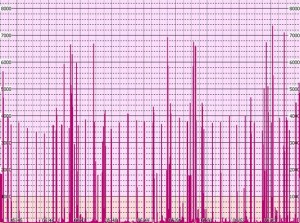 Smart Meters are replacing the traditional method of recording how much gas, electricity and water we are using. Instead of a person (meter reader) coming to your property to document your usage, the information is sent through electronic smart meters to the utility companies through radio frequency signals.
Smart Meters are replacing the traditional method of recording how much gas, electricity and water we are using. Instead of a person (meter reader) coming to your property to document your usage, the information is sent through electronic smart meters to the utility companies through radio frequency signals.
As environmental professionals, we receive frequent phone calls and emails from individuals concerned about potential health effects associated with the radio frequency (RF) radiation emitted from their Smart Meters (utility meters). We have performed measurements with a number of different instruments to find an effective way to test and evaluate emissions from these meters. What we found out is that this is not easily done. You are welcome to download our technical paper on smart meters, the public’s concern and the measurement challenges: Smart Meter: What We Know
Here are some of the challenges we discovered while establishing ET&T’s Smart Meter RF Radiation Measuring Protocol:
- Smart meter emit RF radiation in the 902-928 MHz when transmissions occur.
- Smart meter emit short RF “hand shake” bursts (mini-burst) on average between 2 to 5 times per minute.
- Smart meter emit stronger RF data transmission bursts only a few times a day.
- The transmission burst have last only a very short period of time (milliseconds).
- The transmission burst is intermittent.
- Many RF instruments cannot detect these mini or data transmissions bursts.
We have seen that many inspectors and building owners purchase inexpensive consumer quality instruments and are likely obtaining erroneous results. Taking measurements at a distance of less than 3 feet from the smart meter brings us into the near field, where measurements get really complicated and cannot be reliably performed with consumer quality instruments. The results become bogus data.
Here are some questions you need to ask whoever is taking your Smart Meter RF measurements:
- Which instrument are they using and is it a professional quality instrument?
- What frequency range does the instrument measure?
- What is the accuracy of the equipment?
- Are they doing data logging (recording measurements over a period of time) or are they taking spot readings?
- Are they picking up other RF sources such as radar or cordless phones which make interpreting the data difficult?
- Were the measurements taken in relevant areas where people spend a lot of time?
- Was the measurement taken outside in front of the smart meter?
- Was it taken inside in occupied areas where you spend extended periods of time such as bedrooms or family rooms? It is important to know at which distance the monitoring was taken.
Smart Meter RF transmission bursts vary greatly depending on meter, model, utility provider and programming. The exposure to these bursts also varies by location, distance and obstructions between you and the meter.
 Smart Meters are adaptive and automatically checks itself (self monitoring). We have performed 24 hour monitoring and have seen the following rates in Southern California. Self monitoring burst occur on average between 2 and 5 times a minute and have smaller signal amplitude than when transmitting data. Data transmission bursts occur 2- 3 times a day, the time varies depending on the programming by the utility company and have significantly larger amplitude than the self monitoring bursts.
Smart Meters are adaptive and automatically checks itself (self monitoring). We have performed 24 hour monitoring and have seen the following rates in Southern California. Self monitoring burst occur on average between 2 and 5 times a minute and have smaller signal amplitude than when transmitting data. Data transmission bursts occur 2- 3 times a day, the time varies depending on the programming by the utility company and have significantly larger amplitude than the self monitoring bursts.
To collect enough data to determine your exposure you may need to monitor and data log for 12 to 24 hours. Many instruments are not able to data log or be able to detect the mini data burst at the correct amplitudes. This requires a large dynamic range and capability of the equipment.
Standard measurement procedures need to be established to obtain accurate, reliable and sound information on RF emission and the potential exposure. We found out that it is not so easy to measure smart meters. Based on our experience we have developed a suitable, relatively inexpensive, accurate and repeatable measurement protocol. If you have any further question, please contact us.
Tags: rf emission, rf testing, smart meter, smart metering